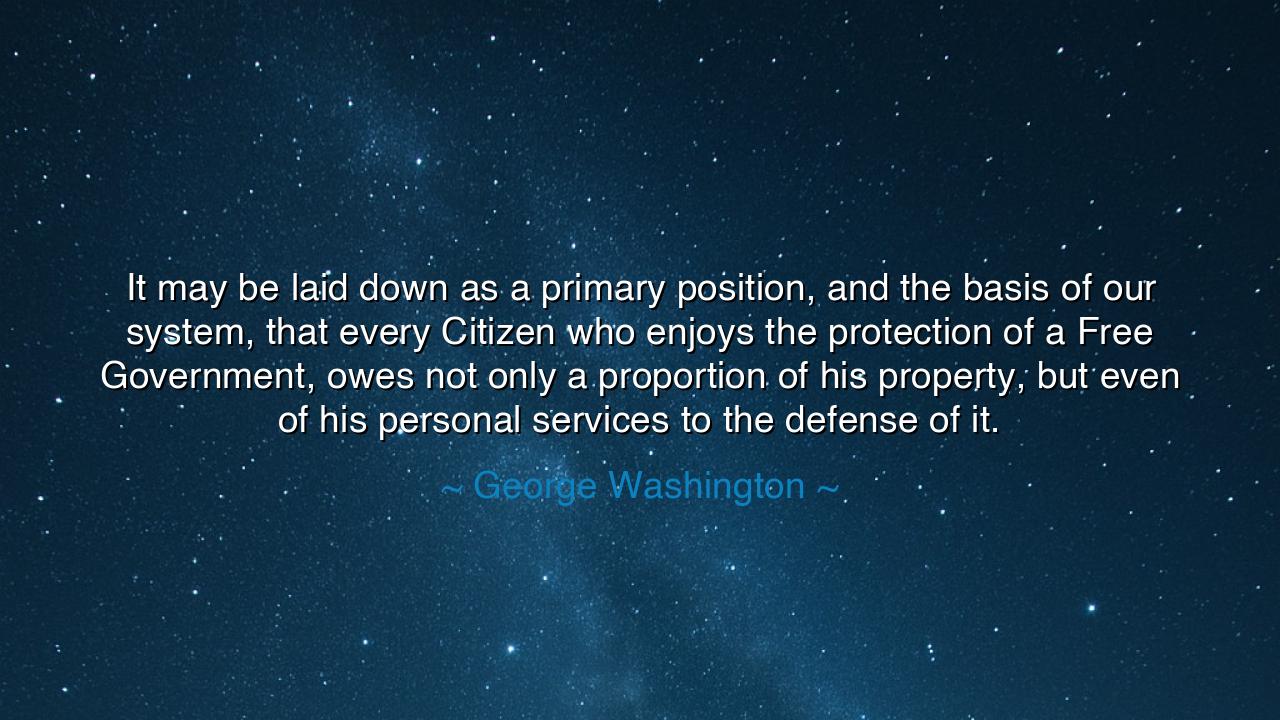
It may be laid down as a primary position, and the basis of our
It may be laid down as a primary position, and the basis of our system, that every Citizen who enjoys the protection of a Free Government, owes not only a proportion of his property, but even of his personal services to the defense of it.






"It may be laid down as a primary position, and the basis of our system, that every Citizen who enjoys the protection of a Free Government, owes not only a proportion of his property, but even of his personal services to the defense of it." – George Washington
In these noble words, George Washington, the Father of the American Republic, declares an eternal truth: that freedom is not a gift freely kept, but a covenant sustained by duty. He speaks as one who knew the price of liberty—not as a philosopher in peace, but as a warrior who had marched through hunger, snow, and blood. To “owe a proportion of his property, and even of his personal services” means that every citizen, rich or poor, scholar or farmer, must bear a part of the burden that liberty demands. For government is not a distant guardian—it is the living reflection of its people, and its defense, therefore, is the people’s sacred charge.
Washington’s words were born in the early days of the Republic, when the memory of war was still fresh, and the wounds of revolution not yet healed. He had seen how fragile the newborn nation was—how easily prosperity could dull vigilance, how swiftly comfort could lead to complacency. His message was not about taxes or armies alone; it was about sacrifice. He believed that freedom, once won by blood, could perish in indifference. Thus, he warned that to enjoy the shelter of a Free Government while giving nothing in return was to betray the very principle upon which it stood.
In spirit, these words recall the ancient virtues of the Greeks and Romans. In Athens, every citizen was both a thinker and a soldier; in Rome, even the wealthy left their villas to stand guard upon the frontier. Washington, who admired those republics, understood that liberty survives only when its citizens are both beneficiaries and defenders. A nation that consumes freedom but does not nourish it with service becomes hollow—a shell of comfort that crumbles at the first strike of adversity.
History offers countless proofs of Washington’s wisdom. Consider the story of the Continental Army at Valley Forge. There, in the winter of 1777, soldiers wrapped their bleeding feet in rags, shivered through nights without food, and yet did not abandon their posts. They fought not for pay, but for principle; not for glory, but for the idea of a land governed by its own people. These were not professional warriors—they were citizens. Farmers, teachers, artisans, and fathers—ordinary souls who gave their “personal services to the defense” of freedom. Their endurance was the living embodiment of Washington’s creed.
This principle extends beyond the battlefield. In every age, freedom must be defended—not only with arms, but with integrity, civic duty, and vigilance. When citizens pay fair taxes, obey just laws, serve on juries, vote with conscience, and speak truth to power, they fulfill the same spirit that once lifted the flag above Washington’s camp. The defense of liberty is not confined to soldiers’ hands—it dwells also in the honest laborer, the responsible parent, the truthful journalist, and the just leader.
But there is danger when people forget this bond. When citizens demand the blessings of government yet refuse its burdens; when they consume liberty as a privilege, not cherish it as a trust—then tyranny finds its path open. Washington knew this, for he had seen how republics decay not from conquest, but from apathy and self-interest. Freedom, he reminds us, is a living flame—it must be fed by duty, or it will fade into darkness.
The lesson for all who hear his words is clear: to enjoy protection is to bear responsibility. True citizenship is not comfort but contribution. Give of your wealth when your country calls, give of your strength when it falters, and give of your voice when truth is threatened. Let your service—whether in arms, in work, or in principle—be your offering to the republic that guards your peace. For as Washington teaches, the foundation of a free nation is not written in ink or parchment alone—it is written in the courage, gratitude, and active devotion of its people.






AAdministratorAdministrator
Welcome, honored guests. Please leave a comment, we will respond soon